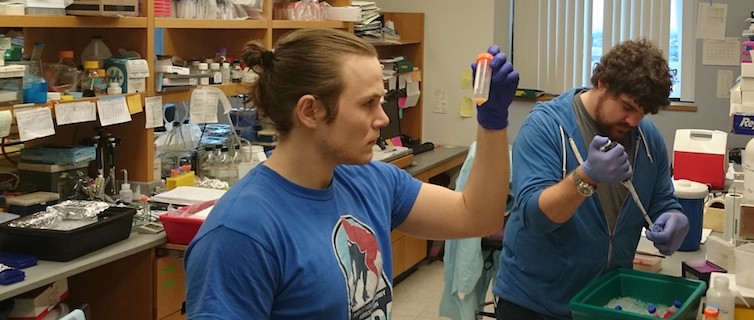Nutrition & Metabolism PhD Program
Nutrition scientists apply the tools of physiology, biochemistry, molecular biology and genetics, as well as epidemiology and social sciences, to questions that are important for understanding the impact of nutrition on human health. They focus on understanding how nutrient metabolism is integrated at molecular, biochemical and physiologic (systems) levels.
Program Overview:
The doctoral program in Nutrition and Metabolism will provide you with core knowledge of the biomedical sciences through the PiBS curriculum and then apply this knowledge to the study of nutrition and metabolism in health and disease. Students also acquire knowledge of translational research at clinical and population-based levels.
- 64-credits if entering with bachelor’s degree and 32 credits if entering with a master’s degree
- 5 year average duration
- Defended research dissertation
Highlights:
- Faculty of ~30 nationally and internationally-known researchers and educators, based in basic science departments and Department of Medicine.
- Students have many research opportunities with well-funded faculty conducting basic, clinical and translational research.
- Training focuses on developing skills in research design and methods as well as critical thinking skills through class discussions of cutting-edge literature in small classes.
- Resources at BU include the NIH-funded Boston Nutrition and Obesity Research Center and the Clinical and Translational Sciences Center.
- Core facilities of BUMC and BU provide outstanding opportunities for broadening knowledge and gaining access to the latest technologies.
- The Evans Center for Interdisciplinary Research sponsors Affinity Research Collaboratives (ARCs), including several that focus on topics in nutrition and metabolism.
- We also have a T32 Training Program in Metabolism, Endocrinology and Obesity, through which several Pre- and Postdoctoral Fellows are funded.
Graduate Outcomes:
Although our program is young, graduates of similar doctoral nutrition sciences programs have gone on to such jobs as:
- research scientists
- clinical associates in the pharmaceutical industry
- biotechnology
- academic positions at colleges/universities/medical schools
- directors of obesity prevention programs
- medical writers
Research Interests:
Our faculty’s research interests include the role of nutrition and nutrient metabolism in the pathogenesis, prevention and treatment of chronic diseases from basic, clinical and epidemiological perspectives.
Nutrient signaling in Obesity and Diabetes:
- Adipocyte biology including adipogenesis and metabolic regulation (Corkey, Farmer, Kandror, Pilch, Puri)
- Islet biology/insulin secretion (Corkey)
- Bioenergentics (Corkey)
- Muscle metabolism, diabetes & exercise (Ruderman)
- Nutrient transport (Hamilton, Kandror, Pilch)
Clinical/Translational Research:
- Obesity, diet and weight loss
- Interventions to prevent sarcopenia of aging (e.g. dietary protein, exercise)
- Dietary factors and childhood obesity
- Vitamin D and health
- Bariatric surgery outcomes
- Diabetes, obesity and inflammation
- Dairy, calcium and risk of obesity and its co-morbidities
- Obesity, menopause and cardiovascular risk
- Obesity and cancer risk
- Diet and blood pressure
- Continuous glucose monitoring in non-diabetic populations
- Physical inactivity and brain aging
